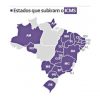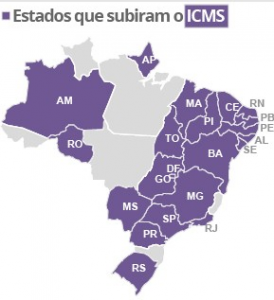The poorest municipalities in the country want different treatment in tax reform. Mayors of the so-called G100, a group that brings together populous municipalities with low per capita income and high socioeconomic vulnerability, presented demands, on Thursday (20), to the Special Tax Reform Commission.
The vice president of the National Front of Mayors for Social Policies, Elias Gomes, complained about the distribution of ICMS, which, according to him, favors municipalities with greater economic dynamism. He is the mayor of Jaboatão dos Guararapes, first on the list of the most vulnerable in Pernambuco, the state with the largest number of municipalities in this situation, 18 in total.

Constitutionally, 25% of the state VAT collection is transferred to the municipalities. The participation index that establishes the percentage that each one will be entitled to is based on the value added tax (VAF), which corresponds to what is economically produced in the municipality. "In general, the cities of the G100 have low economic dynamism, therefore, low VAF, which results in a small slice of the ICMS compared to the size of their populations", explained Elias Gomes.
Municipalities Fund
Likewise, the Municipality Participation Fund (FPM), favors smaller cities. Elias Gomes suggests changes in the distribution criteria to improve the per capita income of these municipalities.
“The tracks inside the FPM are completely oblivious to a fair distribution. For example, municipalities between 100 thousand and one million inhabitants have a certain percentage of participation, so that my neighbor with 110 thousand inhabitants also receives us, who have 700 thousand inhabitants ”, explained Elias.
“This builds inequalities. So, the staggering is less, for every 50 thousand inhabitants, and, with that, justice is done, and the tax is meaningless if it is not to finance people's lives, development, and quality of life ”, he added.
Revenue per capita
Data from the National Front of Municipalities yearbook show that the average per capita revenue of the G100 municipalities is half that of the other municipalities (R $ 1,3 thousand against R $ 2,6 thousand).
Small municipalities with up to 10 inhabitants receive up to five times the amount that the G100 municipalities receive from the FPM, per inhabitant (R $ 1,2 against R $ 250).
Likewise, ICMS revenue per inhabitant in the G100 municipalities is less than half that received by the other municipalities (R $ 219 against R $ 580).
Disordered growth
“You cannot treat unequal people equally. At this rate, we will reach the same level as the other municipalities in 100 years ”, argued Elias Gomes, recalling that the G100 is part of the municipalities that grew rapidly and in disarray in the peripheries of large cities.
“The per capita income of the municipality next to mine, which explores the Port of Suape is 1300 reais, while ours is 180 reais”, lamented the mayor of Pernambuco.
Collection
Congressman Luiz Carlos Hauly (PSDB-PR) considers that the collection of municipalities is poorly explored and suggests changes: “I personally understand that the ISS should join the ICMS and federal consumption taxes - PIS, Cofins e IPI - and make a single base and a single collection of a single national federal tax authority, of states and municipalities in society ”.
The idea, according to him, “is not for each one to have a unit, but to increase the potential of this collection, because if you are very close to the population, you cannot increase the IPTU, ISS, IPVA, but when the federal revenue increases , it is distant, it is diluted, diffuse ”.
The mayors also showed that, in relation to other taxes, the G100 municipalities are also at a disadvantage. ISS per capita revenue is four times lower than that of other municipalities. IPTU is five times smaller. And the Gross Domestic Product (TAX ID No) per capita of these cities is 1/3 of the others.
% Of the population 12
The author of the hearing request, deputy Orlando Silva (PCdoB-SP), points out that the G100 municipalities concentrate 12% of the Brazilian population and that, if treated differently, they can improve Brazil's social indicators. “We need to establish equalization mechanisms for social justice. The FPM can be that instrument ”, he evaluated.
Special service
Lucimar Nascimento, mayor of Valparaíso de Goiás and vice president of the FNP for Health Surveillance, defended differentiated service to the municipalities of the G100 with the reduction of bureaucracy to obtain financing from the BNDES. She also called on the commission to review the distribution of ICMS in the Tax Reform.
The objective, he stressed, is to provide “a new equalization that reduces the time for the G100 to be equal to other municipalities”. She recalled that, of the seven municipalities in Goiás that are part of the G100, five are in the vicinity of the Federal District, a few kilometers from the federal capital.
Carlos Farias, Secretary of Economic Development of Araçatuba, considered that the changes could be made gradually to minimize the impact on other municipalities.







